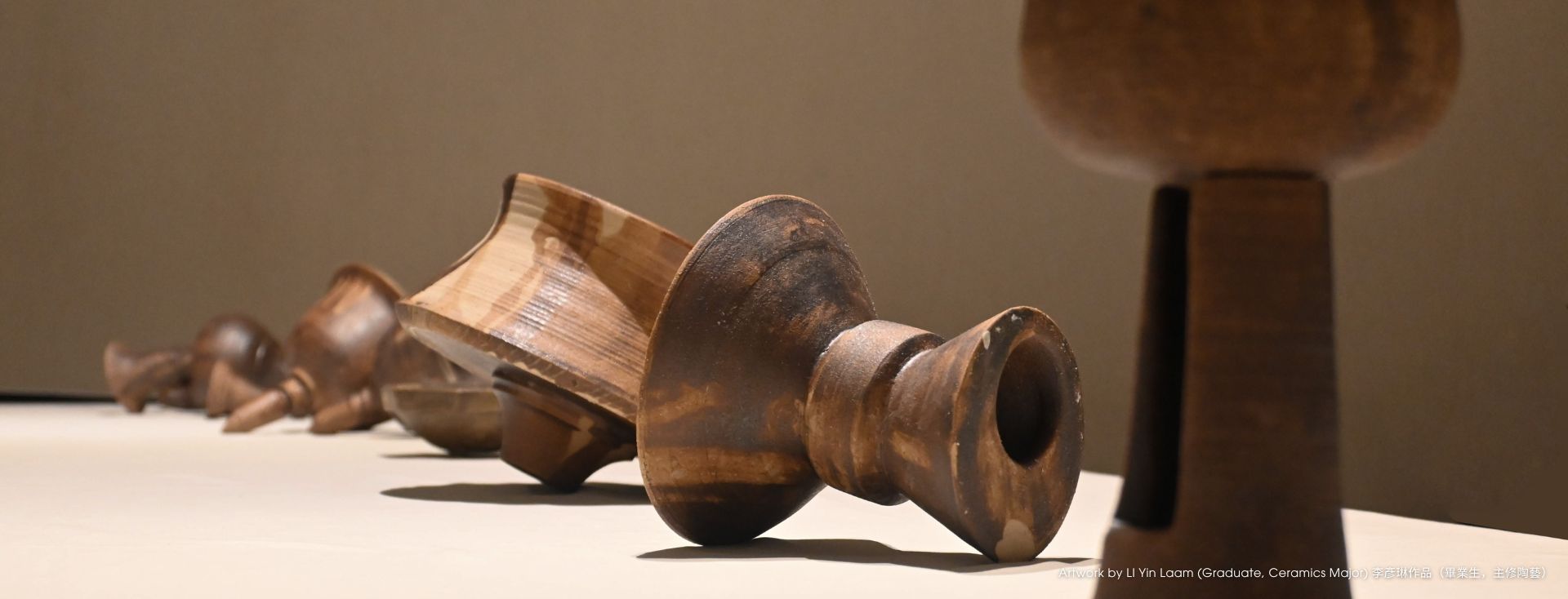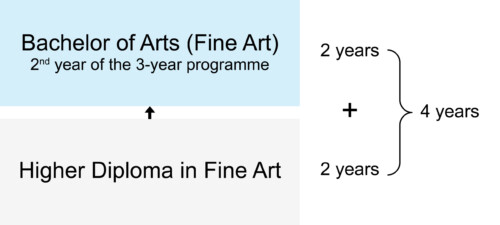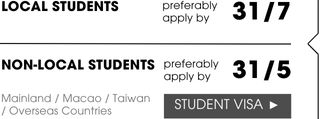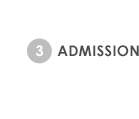
For DSE candidates, School leavers and Mature-age Students who hope to begin your art study journey
with major studio practice (Ceramics / Painting/ Photography / Sculpture)
For programme details and application enquiries, enquirers are always welcome to contact us via our Enrolment hotline: 2922-2822 or email us at: enroledu@hkac.org.hk
PROGRAMME CODE
FA403
MODE & DURATION OF STUDY
2-Year Full-time
COMMENCEMENT DATE
September 2024
TUITION FEE (SUBJECT TO REVIEW)
HK$ 62,556 per year for 2 years
HK$ 125,112 (Total)
Fee to be settled by 6 equal installments, 3 installments per year
(Tuition Fee Deposit which forms part of the 1st installment may be applied)
APPLICATION PROCEDURES
AIMS & OBJECTIVES
The Higher Diploma in Fine Art programme aims at providing students with the opportunity to build up professional platform in skills and knowledge in the fine art area. With specialized study and relevant generic and broad-based skills, students will be able to think critically about art, become technically competent in various mediums and approaches, have a strong awareness of the theoretical and cultural context of their area of study, and work independently with appropriate analytical and evaluative skills. The programme also prepares students for future artistic development or further academic studies in conjunction with Fine Art disciplines and other creative fields.
PROGRAMME FEATURES
- Promote visual awareness and nurture creative and critical thinking of students through the processes of experimentation and exploration.
- Guide students to develop the understanding of contemporary modes of visual thinking, creative methodologies, visual research skills and independent thinking.
- Encourage the mastering of technical, perceptual and conceptual skills, and develop the specific skills required for both local and international exhibition practices.
- Equip students to position their art making both historically and within contemporary visual discourses.
- Encourage students to take an individual pathway through the course, leading to self-realisation, self-exploration and expression of individualism.
- Provide articulation opportunities to the Bachelor of Arts (Fine Art) programme jointly presented by the School and the RMIT University.
HOW WILL IT BE DELIVERED?
- Studio or workshop-based classes conducted by practicing artists
- Face to face lectures
- Small-class tutorials and discussion
- Local field trips, and visits to workshops, museums, galleries and art studios
- Extra-curricular projects conducted by the School and the Hong Kong Arts Centre may also be available
PROGRAMME ARTICULATION
Students completing the Higher Diploma in Fine Art programme are eligible for articulating to the 2nd year of the Bachelor of Arts (Fine Art) programme jointly offered by the School and the RMIT University, and complete both the Higher Diploma programme and the Bachelor Degree (Top-up Degree) programme in (2+2) 4 years of time.*
*Subject to availability of programme offer

Remarks:
The Higher Diploma in Fine Art programme is accredited by the Hong Kong Council for Accreditation of Academic and Vocational Qualifications for a period from 5 May 2008 to 31 August 2026, with QR Registration No: 08/001866/4 recognized programme at QF Level 4.
The programme consists of 78 credit units, 936 contact hours. It begins with modules of foundational nature, in which students can expose themselves to different mediums, techniques, art-historical theories, as well as to strengthen their generic and language skills. In the upper year, the course will focus on studio-based modules. Students can choose their major area of study from the four disciplines, namely, Ceramics, Painting, Photography and Sculpture.
Alongside with the regular class meetings, supplementary and extra-curriculum activities, such as forum and seminars which will be beneficial to students, will be arranged.
Students are expected to meet 3 to 5 days a week. Classes are usually held during the day (i.e. morning and afternoon), while occasionally some classes are conducted on weekday evenings or during the weekends.
Year 1
Term 1 (Sep – Nov)
- +Critical Thinking & Creative Problem Solving
- This module aims at providing students with skills of critical thinking and creative problem solving which facilitate students to further build up perceptual, analytical, critical and conceptual abilities and prepare them to be independent and self-motivated learners throughout the programme.
- +Visual Culture
- Students will explore the impacts of digital media on contemporary thinking, human expression and behaviour in the modern world, as well as the manipulation of formal elements in terms of cultural expression.
- +Drawing I
- This module focuses on strengthening students’ observational skills through different traditional and contemporary approaches to drawing figure, still life, and other subjects. Advanced drawing tools and various materials will be introduced and different vocabularies of drawing will be studied.
- +3D Visualization
- This module provides the students with the concepts and techniques on 3D Visualization that enable them to further develop their own sensibilities and capabilities in 3-dimensional representation.
Term 2 (Dec – Mar)
- +Drawing II
- In addition to helping students consolidate the established skills and knowledge they acquired from Drawing I, this advanced module introduces the self-expressive drawing approach to the students.
- +2D Visualization
- This module focuses on the usage of images for visualizing conceptual and narrative ideas.
- +Western Art History I
- The module presents a chronology of stylistic developments from the Greco-Roman period to the mid-nineteenth century in Europe. The focus of the study is mainly on the categories of painting and sculpture with discussion on the technique of visual analysis and interpretation.
- +Creative Chinese Writing
- This module leads students to explore the potentiality of using the Chinese language as a medium of creation and expression.
- +Interactive English Communication
- This module enables students to develop an approach to better engage with the English language, and to learn to confidently adopt English as a means of interaction and communication, especially within the artistic context.
Term 3 (Apr – Jul)
- +Introduction to Chinese Art History
- This module gives students a survey of Chinese art with a balance among the historical context, the objects of study, their production techniques and creative processes.
- +Specialization IA
- Students are required to complete three specialization modules of Specialization I (namely, Specialization IA, IB, and IC) and three modules of Specialization II (namely, Specialization IIA, IIB, IIC) before identifying their major area of study. Students have the opportunity to choose from the four disciplines, Ceramics, Painting, Photography and Sculpture and study three of them. The established skills and knowledge in relation to the professional studio practice of the disciplines will be introduced in the Specialization modules.
- +Specialization IB
- Students are required to complete three specialization modules of Specialization I (namely, Specialization IA, IB, and IC) and three modules of Specialization II (namely, Specialization IIA, IIB, IIC) before identifying their major area of study. Students have the opportunity to choose from the four disciplines, Ceramics, Painting, Photography and Sculpture and study three of them. The established skills and knowledge in relation to the professional studio practice of the disciplines will be introduced in the Specialization modules.
- +Specialization IC
- Students are required to complete three specialization modules of Specialization I (namely, Specialization IA, IB, and IC) and three modules of Specialization II (namely, Specialization IIA, IIB, IIC) before identifying their major area of study. Students have the opportunity to choose from the four disciplines, Ceramics, Painting, Photography and Sculpture and study three of them. The established skills and knowledge in relation to the professional studio practice of the disciplines will be introduced in the Specialization modules.
Year 2
Term 1 (Sep – Nov)
- +Western Art History II
- The advanced module examines the major art movements from the mid-nineteenth century through WWII to the 1980s in Europe and the United States. The main art forms studied are painting and sculpture, and the discussion are focused on representative works by influential artists.
- +Specialization IIA
- Students are required to complete three specialization modules of Specialization I (namely, Specialization IA, IB, and IC) and three modules of Specialization II (namely, Specialization IIA, IIB, IIC) before identifying their major area of study. Students have the opportunity to choose from the four disciplines, Ceramics, Painting, Photography and Sculpture and study three of them. The established skills and knowledge in relation to the professional studio practice of the disciplines will be introduced in the Specialization modules.
- +Specialization IIB
- Students are required to complete three specialization modules of Specialization I (namely, Specialization IA, IB, and IC) and three modules of Specialization II (namely, Specialization IIA, IIB, IIC) before identifying their major area of study. Students have the opportunity to choose from the four disciplines, Ceramics, Painting, Photography and Sculpture and study three of them. The established skills and knowledge in relation to the professional studio practice of the disciplines will be introduced in the Specialization modules.
- +Specialization IIC
- Students are required to complete three specialization modules of Specialization I (namely, Specialization IA, IB, and IC) and three modules of Specialization II (namely, Specialization IIA, IIB, IIC) before identifying their major area of study. Students have the opportunity to choose from the four disciplines, Ceramics, Painting, Photography and Sculpture and study three of them. The established skills and knowledge in relation to the professional studio practice of the disciplines will be introduced in the Specialization modules.
Term 2 (Dec – Mar)
- +Interdisciplinary Project
- This module will focus on cross-disciplinary approach and is designed for students to gain knowledge and skill. The content of the module will cover various art disciplines, with an aim to broaden the exposure of art students.
- +Contemporary Art
- The module offers students a sophisticated knowledge on the development of contemporary art from the mid-twentieth century to the present time. Important artists and their works will be investigated under a broad range of thematic headings.
- +Supervised Studio Practice I
- This module gives students opportunity to obtain adequate studio practice in their major study with professional guidance in school. In this module, students are allowed to practice in another studio, in which they have previous training in the specialization modules, other than that of their major area of study, and to integrate their own major techniques with the approaches they obtain from other major studio workshops.
- +Graduation Project I
- The module intends to provide progressive information and professional advices to students for the production of a series of work for their graduation exhibition. Students explore their own personal interests and initiate their proposals in corresponding with the chosen major, developing the idea and implementing resolved works at the end of the whole programme.
Term 3 (Apr – Jul)
- +Hong Kong Art
- This module comprises of well-informed lectures on the cultural, social and economic contexts of Hong Kong art of the 20th century. Special attention is given but not restricted to Hong Kong visual art, interesting topics in performing and literary art will also be examined.
- +Project Management
- This module provides various management skills relating to the practice of a professional artist. Content components include writing proposal, approaching galleries, finding working partners and sponsors from community and organizations.
- +Supervised Studio Practice II
- This module gives students opportunity to obtain adequate studio practice in their major study with professional guidance in school. In this module, students are allowed to practice in another studio, in which they have previous training in the specialization modules, other than that of their major area of study, and to integrate their own major techniques with the approaches they obtain from other major studio workshops.
- +Graduation Project II
- The module intends to provide progressive information and professional advices to students for the production of a series of work for their graduation exhibition. Students explore their own personal interests and initiate their proposals in corresponding with the chosen major, developing the idea and implementing resolved works at the end of the whole programme.
The number of credit for each module above is 3, except Supervised Studio Practice (I & II) and Graduation Project (I & II), which are accordingly with 4 credits and 3.5 credits.
Specialization
Major Discipline
Students choose 3 from the above 4 disciplines as their specialization areas of study.
Upon satisfactorily completion of the 3 chosen specializations, students can further choose one discipline as their major area of study by identifying it as the main medium / theme of their graduation project.
Students’ response contributes the major part of the School’s decision on offering or cancelling a Specialization / Major Discipline and HKAS?reserves the right in this regard at its own discretion.
ADMISSION REQUIREMENTS
- Level 2 (or above) in five Hong Kong Diploma of Secondary Education (HKDSE) subjects including English and Chinese;
- Each applicant is allowed to use not more than two Applied Learning subjects in the application;
- Preferably with “Attained with Distinction” in Applied Learning subjects; or
- One A Level or an equivalent number of AS Level subjects in Hong Kong Advanced Level Examination (HKALE); and
- 5 passes in HKCEE including English and Chinese; or
- 3 passes in HKCEE plus level 2 or above in English and Chinese; or
- Satisfactory completion of a pre-AD or an equivalent programme; or
- Holder of Foundation Diploma in Visual Art from Hong Kong Art School; or
- Mature student at age 21 or above with substantial relevant experience; or
- Candidate with substantial relevant background to be assessed by the School.
ENROLMENT
- Please make sure you meet the application requirements of the programme you are applying for.
- Candidates may be requested to demonstrate language proficiency, or attend corresponding language test(s).e.g.IELTS
- Special Admission may be considered at the discretion of the School for candidates who can demonstrate exceptional excellence in their relevant folios.
- A non-refundable application fee of HK$200 will be levied.
- Please submit the completed Award-bearing Programme Application Form (Form No. HKAS002) together with relevant supporting documents, and application fee via one of the following ways:
- In person to the Enrolment Office of Hong Kong Art School.
Address: Hong Kong Art School Chai Wan Campus (Rm 819, 8/F Youth Square, 238 Chai Wan Road, Chai Wan)Opening Hours: Monday – Friday 9am – 7pm Closed on Saturdays, Sundays and Public Holidays - By post to the Enrolment Office of Hong Kong Art School (address as above)(Please DO NOT mail the CASH by post)
- By email to application@hkac.org.hk (confirmation of application is subject to receipt of payment)
- In person to the Enrolment Office of Hong Kong Art School.
PAYMENT METHOD
- By Crossed Cheque / Bank Draft made payable to the “Hong Kong Arts Centre”
- By Cash (Only applicable to enrolment made in person to the Enrolment Office)
- By Bank Account Transfer
Please transfer the payment to the following bank account, and email the remittance advice with your name and programme code (“FA403” for Higher Diploma progamme) quoted to application@hkac.org.hk
Bank Name: HSBC
FPS ID: 107697286
Account No.: 022-009575-001
Account Name: Hong Kong Arts Centre
*Please be reminded that all bank charges incurred (if applicable) would be absorbed by the applicant/payment sender
Remarks:
- Hong Kong Art School reserves the right to make adjustments to the admission requirements as and when necessary, and/or with reference to the guidelines and practice as set out by the public institutions funded by the University Grant Committee (UGC), and the direction of the Joint Quality Review Committee (JQRC) and The Federation for Continuing Education in Tertiary Institutions (FCE).
SCHOLARSHIP
Scholarships opportunities are available.
EXEMPTION POLICY
Module exemption will be granted to student if he/she can demonstrate in his/her submitted portfolio or qualifications that he/she has completed in another subject having a high level of correlation in terms of breadth, depth and assessment level to the subject to be exempted. The maximum percentage of exemption a student can be granted is no more than one-third of the modules of the programme. Modules under the category of Professional Studies of the programme are however not open to exemption application.
| CHAN Hiu Kwan |
| CHAN Kiu Hong Joe |
| CHAN Sai Lok |
| CHAN Sum Yan Tap |
| CHEUNG Sze Lit |
| CHEUNG Wai Sze Rachel |
| CHING Chin Wai |
| KONG Chun Hei |
| Dr. LAI Kin Keung Edwin |
| LAM Laam Jaffa |
| LAM Yik Lan |
| LEE Hoi Yin |
| LEE Pik Wai Louise * |
| LEE Suet Ying |
| LO Man Him Virginia |
| POON Fai Wong |
| TSANG Chui Mei |
| WONG Ka Man Carmen |
| WONG Lai Ching Fiona |
| YAU Man Pun |
| YEUNG Suet |
| YUEN Kam Wa |
| LIN Kam Shun |
* Programme Coordinator
HDFA students may apply for financial assistance schemes provided by the Government, with details as follows:
- Non-means-tested Loan Scheme for Post-secondary Students (NLSPS)
- Financial Assistance Scheme for Post-secondary Students (FASP)
- Student Travel Subsidy for Tertiary of Post-secondary Students (STS)
And /or
- Deduction of Tax for Training





